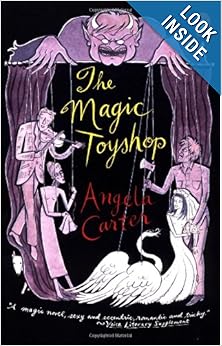Feminism in Angela Carter’s “The Magic Toyshop”
In the beginning, the reader experiences Melanie's discovery of herself – as a creation made of flesh and blood, and as a sexual being (1). She imagines herself as a nude model for Lautrec and sees her self-worth in the appreciating gaze of a man and not in her mental prowess.
The summer she was 15 years old, the only thing Melanie was concerned with, was perusing her body and building up fantasies around her body. Aside from this, her responsibilities are helping with the washing-up and watching her little sister to see that she does not kill herself at play in the garden (2, emphasis mine). By this action, Melanie unconsciously reflects the social discrimination of the society since, “there is much in the Rights of Woman which suggests that the enfeeblement and male dependency of a woman is traceable to her own self-dereliction” (Soper 56). She also reflexively accepts her subjection in the world, as only being capable of being an object of pleasure.
According to Jean Wyatt, a comparative literature professor, Melanie thinks of herself as an exuberant subject, when she is already part of a system of representation that defines her as object (Wyatt 69). There is no doubt that Melanie’s father is a patriarchal kind of man: he expects his family to depend on him solely, does not save for the future, and has a trophy wife. It is therefore conceivable that his ways of thinking might have rubbed off on Melanie.
However, it might be a little extreme to put all the blame on Melanie’s father as the women in her life were not strong models. They all seem to defer to a male figure, whether real or imagined. Mrs. Randle is said to have adopted the married form by deed poll on her fiftieth birthday as a present to herself. Mrs. Randle obviously considers it a great honor to be addressed and seen as a married woman; she thought ‘Mrs.’ gave a woman a touch of personal dignity as she grew older (3). Melanie’s mother, a model wife, builds her life around her husband. She is featured in a celebrity home edition magazine and goes with her husband on his trip. Not much is known of her character; however, the picture of a totally dependent woman is conjured with the little information provided about her.
After Melanie’s parents are killed in an air crash while in the United States, she goes to live with Philip Flowers, her uncle. Philip is nothing short of a tyrant and is “a caricature of the patriarchal society” (Day 23). He degrades Margaret (his wife), her siblings and the wards entrusted in his care. He seems to suck the life out of them, making them zombies, or better still puppets, with him pulling the strings. He also expects filial obedience from them all.
Margaret becomes dumb on her wedding day. The illness is said to have “come to her on her wedding day, like a curse—her silence.” This sounds like a characteristic of Posttraumatic Stress Disorder (PSTD) when a patient retreats inward in order to cope with psychological trauma. According to the Diagnostic and Statistical Manual of Mental Disorders, a traumatic stressor explicitly involves the experience of a threat or injury to a physical body. Trauma is said to be caused by frequent violation of the person's familiar ideas about the world and of their human rights, putting the person in a state of extreme confusion and insecurity. Margaret is treated like a puppet; Uncle Philip presents her with a necklace that chokes her as a wedding present (124). Ironically, he makes the same necklace for the Queen puppet, which at the sight of, “Margaret surreptitiously ran her finger round her own silver choker as if the sight if the Queen’s collar had reminded her of how much her own hurt” and how much her spirit is broken (129). Uncle Philips’ domineering attitude prompts Margaret to withdraw herself from the situation the only way she knows--losing her voice. Her losing her voice is her coping strategy, since she later regains her voice when she, alongside the rest of the family, stands up to Uncle Philip at the end of the novel.
Philip’s action is that of a “patriarchal terrorism, one that tends to be perpetrated by men toward women and includes not only physical violence, but also "economics subordination, threats, isolation, and other control tactics” (Carlson 291). Not only is Margaret psychologically tortured by Uncle Philip, he also physically restrains her, by limiting her interaction with the world and depriving her of handling money. Margaret never leaves the toy shop except when going for grocery shopping. This changes when Melanie comes along; Melanie is then entrusted with such chores. Also, since the family only deals in credit with the stores they frequent, Uncle Philip is able to ensure the enslavement of his wife. Margaret has no money of her own and never handles money, so she cannot escape the drudgery of her life with Philip, and is helpless against him. This makes it easy to see why the idea of financial stability for women has for ages been the core priority of feminist activist, one that all feminist waves agree on, because if it had been otherwise for Margaret, she would probably have stood up to Philip faster.
After the whole family revolts against Philip, at the end of the novel, Melanie once again transitions from one life of enslavement to another. At the end of the narration, she becomes like the women in her life, dependent on Finn for survival: she has no money like Margaret to stand on her own; there is a possibility that she might end up marrying Finn since he is the only one around; and since she is not educated, there is a stronger possibility that she might be a housewife like her mum and Margaret. This is ironic, because one would expect the heroine of a gothic/feminist novel to gain her independence at the end of the tale and be free as a bird. This begs the question: does a woman ever get to a point where she is completely independent from men? Or does she just exchange one form of dependency to a milder one, in the name of liberation?
Although Carter illustrates and thereby questions the dependency of women on men, she however does come not project the issues of feminism strongly; she just dances around certain feminist circumstances. Elizabeth Gargano in her article, The Masquerader in the Garden: Gender and the Body in Angela Carter’s “The Magic Toyshop,” states that “for Carter, a feminist theoretical stance emerges as a work in progress. In fact, it is more a dance than a 'stance,' more a deft series of adjustment in relation to changing condition rather than a fixed position,” because it “dances on the dangerous divide between the potential essentialism of feminist identity politics of the 1960s and the 1970s and the sweeping appeal of gender performativity in 1990s” (57-8). Carter does not come out strongly about the issues of feminism; she just depicts a tale of how circumstances can make a woman dependent on men. And by doing so, she illustrates the circle of life--whatever a child sees and is exposed to, is what the child becomes.
Work Cited
Carlson, Bonnie E. "A Stress and Coping Approach to Intervention
with Abused Women." Family Relations 46.3 (July 1997): 291-98. Jstor. Web.
03 Apr. 2011. <http://http://www.jstor.org/stable/585127>.
Carter, Angela. The Magic Toyshop. New York: Penguin, 1967. Print.
Day, Aidan. Angela Carter: The Rational Glass. New York:
Manchester, 1998. Print.
Diagnostic and Statistical Manual of Mental Disorders. 4th ed.
Washington, DC: American Psychiatric Association, 1994. Print.
Gargano, Elizabeth. "The Masquerader in the Garden: Gender
and the Body in Angele Carter’s The Magic Toyshop." Women's Studies: An
Inter-disciplinary Journal 36 (2007): 57-78. informaworld.com. Routledge:
Taylor & Francis Group. Web. 21 Jan. 2011.
Soper, Kate. "Naked Human Nature and the Draperies of Custom:
Wollstonecraft on Equality and Democracy." Feminism: Critical Concepts in
Literary and Cultural Studies. Vol. 1: Feminism and the Enlightenment. New
York: Routledge, 2001. 253-67. Print.
Wyatt, Jean. "The Violence of Gendering: Castration Images in
Angela Carter's The Magic Toyshop, The Passion of New Eve, and "Peter and
the Wolf"" Critical Essays on Angela Carter. Ed. Lindsey Tucker. New
York: G.K. Hall &, 1998. 60-80. Print.



Comments
Post a Comment